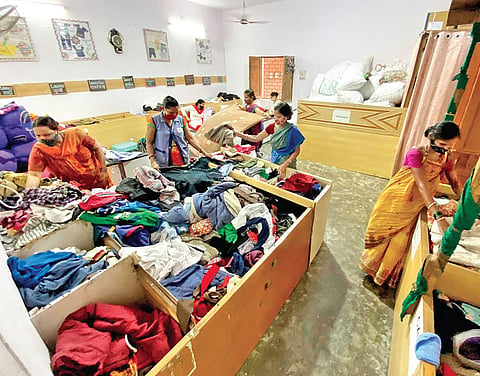

The latest edition of Dignity Diaries, a journal by NGO Goonj, applauds their female employees who segregate, pack relief material, and upcycle fancy products from waste fabric. Founded in 1999 with an aim to use urban discard as a tool to alleviate poverty, the Delhi-based NGO had started publishing these journals after the first wave on the workings at the NGO in the pandemic.
Anshu Gupta, Founder, Goonj, feels that money given to a woman leads to growth in the family, which has an impact on education and health. “Moreover, the ID card, uniform and opportunity to learn gives them pride. We give preference to single mothers, widows, and those in a family crisis,” says Gupta, who believes the women are skilled artisans and employing them is their way of helping them live a dignified life.
Here, are three stories from the Delhi unit in Madanpur Khadar that employs over 200 women, struggling for basics.
Reena Devi, 44, Leader, Green By Goonj
Most women have to leave their jobs when they have kids, but Reena continued working. “My son was four when I joined this job. My husband didn’t want me to work, but I was determined. I spoke to the principal of a private school nearby, who allowed him to sit in the class without admission. Until, I managed the money for his admission, they taught him for free,” she adds.
Today, Devi oversees a team of over 20 women. “At Green By Goonj, we recycle waste fabric coming in from other departments of the unit and make 113 types of articles such as bag, laptop bag, purse, mobile covers, etc. I decide what has to be made from which fabric, the colour scheme to be used and designs to be made,” she says.
Gupta heard about Goonj from a woman in her locality, and joined it 14 years back for just Rs 2,000. Now, she commands a good pay. “This work has enhanced my knowledge about how what we considered garbage can be made into such nice articles.” On the personal front, life is good. “I just married off my daughter. Even my husband supports my job.”
Nibha Jha, 32, Leader, Not Just a Piece of Cloth
Jha joined Goonj in 2006, on realising her husband’s income (he worked at a printing press) was not enough to sustain a family in Delhi. “I did not have kids then but I started preparing for my future. I live close to the unit, and dropped in. I got the job because I knew how to stitch,” adds Jha.
Today, a total of 20 women work under her. “We create cloth pads from oversized, surplus, torn cotton and semi-cotton clothes that are first washed, sanitised, dried, and then recycled. These pads are included in Goonj Family Kit, disaster relief kits, and rural development kits. These are sent across Delhi and especially to rural areas, where people refrain from talking about menstruation,” she adds.
When she had her first daughter, she took a three-month maternity leave. “Then Anshu sir called me saying, you come back, we have a lot of people to take care of the kid. My daughter grew up here till she went to school. During my second delivery, I was given a year’s leave. I am at home here.” Jha has only studied till Class 8, but feels fortunate to secure a job that is helping many people.
Neelam Singh, 47, Leader, Sorting Department
Neelam had come to Delhi with her husband and two daughters from Bihar to Delhi because their financial condition was very bad. “Back at village, I had applied for a job at anganwari, I had got an interview call thrice but my family members, including my husband, never allowed me to pursue a job. However, when the need arose, my husband didn’t stop me from working,” adds Singh, who joined Goonj in 2008.
Soon after joining, she had her third kid. “My husband supported me. He looked after our daughter during the day as he did a night shift as a security guard. That’s how I used to work during the day,” she says.
Now, she heads the sorting unit. “We segregate men’s, women’s and kids clothes. Then, compile a list of all we have, and make into kits - ration, women, married, office, and anganwari kits,” she says. She feels all women should work. “I got several women in need here, and they got jobs and are now working with confidence.”